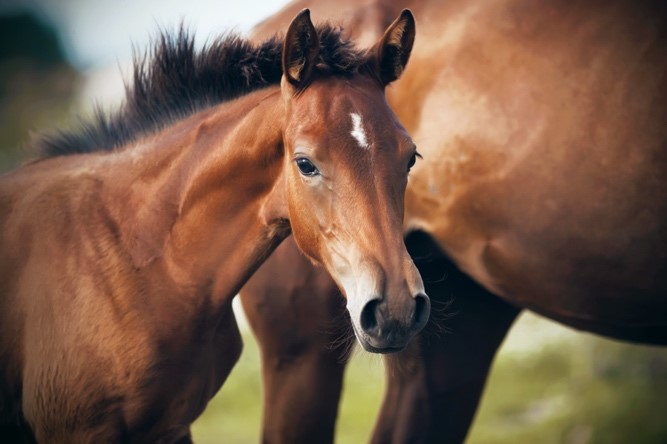Research identifies first case of Fragile Foal Syndrome in Thoroughbred horses
A new collaborative research study has found the first case of Fragile Foal Syndrome (FFS) in a Thoroughbred, a condition previously thought to only be found in Warmblood horses.
This research was conducted by the Royal Veterinary College (RVC), with the University of California Davis Veterinary Genetics Laboratory (VGL) and Rossdales Laboratories, Newmarket.The disorder is characterised as a connective tissue defect caused by a change in DNA within the procollagen-lysine, 2-oxoglutarate 5-dioxygenase1 (PLOD1) gene. The condition is inherited as an autosomal recessive disorder, which means a foal will only be affected by the disorder if it has two copies of the mutation. Affected foals are typically born with extensive skin lesions due to abnormally thin and fragile skin, and other musculoskeletal abnormalities leading them to be aborted, stillborn or euthanized shortly after birth.
Given its historical association with Warmbloods, the condition was called Warmblood Fragile Foal Syndrome (WFFS). However, Dr Rebecca Bellone and her team at VGL, UC Davis recently identified this change in DNA in the PLOD1 gene in other breeds prompting her to approach the RVC Equine Pregnancy Laboratory to screen for the condition in their biobank of clinical cases of pregnancy loss.

Challenging the previous misconception that the disorder was unique to Warmblood horses, these findings in a Thoroughbred foal, published in Equine Veterinary Journal, link the same change in DNA in the PLOD1 gene with the same developmental abnormalities described in affected Warmblood foals. The outcome is a proposed update of the condition’s name to Fragile Foal Syndrome to reflect these findings and ensure appropriate use of testing methods. The publication also describes the clinical presentation of the condition prior to the delivery of a foal with FFS pointing to the need for new research that focuses on defining diagnostic criteria for FFS prior to pregnancy loss.
The study highlights the importance of genetic testing for FFS in horse breeds that carry the gene mutation to inform breeding decisions and avoid producing affected foals.
Jessica Roach, PhD student at the RVC, said:
“Pregnancy loss, stillbirth and neonatal death remain an important source of reproductive losses for horse breeders worldwide. Over the course of my PhD we have collated a large biobank of tissue and data from late term pregnancy losses through the generous co-operation of UK and Ireland TB stud farms and Rossdales Laboratories, Newmarket. This has allowed us to explore the risk factors and pathology of many different causes of abortion and stillbirth. The collaboration with UC Davis and Lexi Grillos provided a fantastic opportunity to explore Fragile Foal Syndrome in our TB population and identify the first TB affected individual. Whilst clearly a distressing condition for affected foals and their owners, the good news is that this lethal syndrome can be avoided with testing and careful mating selection.”
Dr Rebecca Bellone, Director at UC Davis Veterinary Genetics Laboratory, said:
"It has been an honour to get to collaborate with Dr. de Mestre and the rest of her team at the RVC on this very important study to advance what we know about the fragile foal syndrome in horses. This collaboration was an exciting opportunity that blossomed from a veterinary student's (Lexi Grillos) desire to explore her two passions in reproductive biology and genetics through the Student Advanced Training in Research at UC Davis and Global Programs International Travel Fund that allowed her to travel to RVC for research training. Aside from contributing to the science that is enabling tools for improved breeding and clinical management of animals, among my favourite things about being a professor is the serendipity in science that leads to great collaborations and lasting friendships.”
Notes to editors
Reference A.S. Grillos, J.M. Roach, A.M. de Mestre, A.K. Foote, N.B. Kinglsey, M.J. Mienaltowski, R.R. Bellone. First reported case of fragile foal syndrome type 1 in the Thoroughbred caused by PLOD1 c.2032G>A. Equine Veterinary Journal, online available here https://beva.onlinelibrary.wiley.com/doi/10.1111/evj.13547
https://doi.org/10.1111/evj.13547
For more information please contact:
- Jasmin De Vivo or rvc@plmr.co.uk
- Press Line: 0800 368 9520
About the RVC
- The Royal Veterinary College (RVC) is the UK's largest and longest established independent veterinary school and is a Member Institution of the University of London. It was the first in the world to hold full accreditation from AVMA, EAEVE, RCVS and AVBC.
- The RVC is ranked as the top veterinary school in the world in line with the QS World University Rankings by subject, 2021.
- The RVC offers undergraduate and postgraduate programmes in veterinary medicine, veterinary nursing and biological sciences.
- In 2017, the RVC received a Gold award from the Teaching Excellence Framework (TEF) – the highest rating a university can receive.
- A research led institution with 79% of its research rated as internationally excellent or world class in the Research Excellence Framework 2014.
- The RVC provides animal owners and the veterinary profession with access to expert veterinary care and advice through its teaching hospitals and first opinion practices in London and Hertfordshire.

